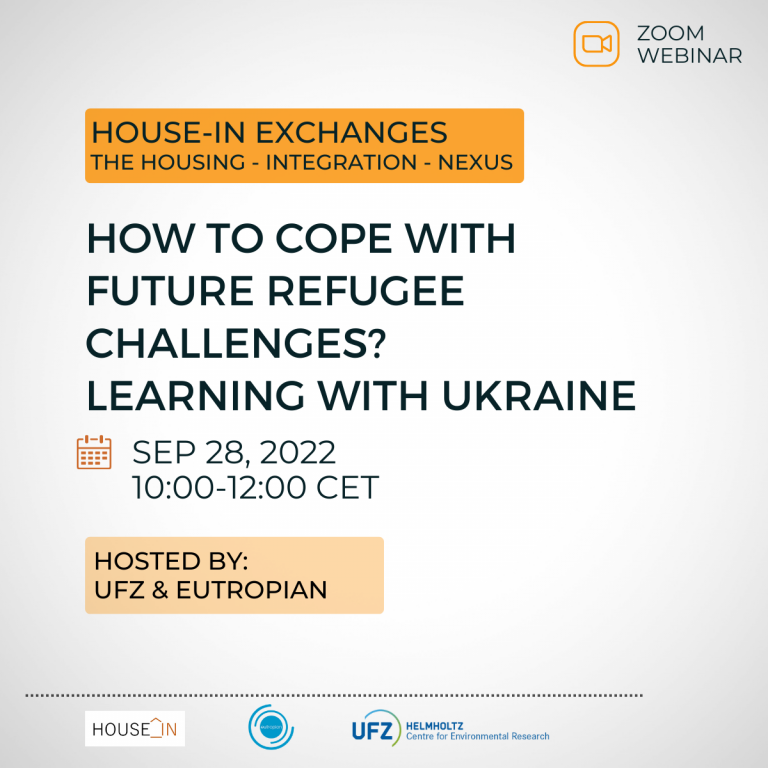Subscribe to our joint NEWSLETTER for
EUTROPIAN &
COOPERATIVE CITY MAGAZINE


On 28 September 2022, Eutropian hosted a workshop on the topic of migrants’ access to housing in Europe, together with the Helmholtz Centre for Environmental Research (UFZ) and The Bartlett Development Planning Unit at University College London. The focus was on analysing how the specific housing needs of different migrant groups are met and how we can respond quickly to fluctuating refugee situations.
The event took place within the framework of the JPI Urban Europe funded project House-In whose focus is on challenges at the housing-integration intersection for migrant newcomers in European cities.
While the House-In project was already ongoing when the war broke out in Ukraine, the partners found it essential to react to this new situation as it offers offers new perspective and challenges to questions of housing and discrimination.
Project partners:
Helmholtz-Centre for Environmental Research (UFZ); The Bartlett Development Planning Unit, University College London; Eutropian GmbH; Lund University – Housing Development & Management; Malmö University – School of Arts and Communication; University of Latvia – Department of Anthropology Studies; Österreichische Akademie der Wissenschaften, Institut für Stadt- und Regionalforschung
In this video, Valeria Lazarenko from the Leipniz Institute for Research on Society and Space discusses the challenges that Ukranian refugees experience when accessing housing , when it comes to adequate housing and integration measures. What are targeted measures in access to housing crucial? Why do we have to view the term ‘integration’ from a critical perspective? Find out more in this video.
Valeria Lazarenko is a research fellow at the Leipniz Institute for Research on Society and Space. Lazarenko’s research interests lie within migration and migrant’s access to space.
In this video, Karoline Niknafs from Dachverband discusses the situation with Ukrainian refugees from Vienna’s perspective. Niknafs raises concern regarding the decentralised organisation of information as well as the decreasing options for private and public housing access in Vienna. What is the role of NGOs in connecting migrants with adequite housing options? What strenghts do NGO’s have that could be integral in making housing inclusive? Find out more in this video.
Karoline Niknafs is a migration specialist at Dachverband, an umbrella organisation for social services in Vienna, Austria.
In this video, Paula Dominiak from Habitat for Humanity Poland presents the work that the organisation does to support refugees arriving to Poland, with topics such as housing and employment support. What is Habitat for Humanity and how do they support refugees in times of need? Find out more in this video.
Paula Dominiak is an advocacy specialist at Habitat for Humanity Poland. Find out more information about the work that Habitat for Humanity Poland does here.
In this video, Ieva Raubiško from the University of Latvia discusses the challenges that refugees face when accessing adequite housing in Riga, Latvia. How does the government support Ukrainian refugees and what happens when this support ends? Find out more in this video.
Ieva Raubiško is a social anthropologist at the Faculty of Humanities at the University of Latvia. Raubiško also works as a researcher at the Providus Centre for Public Policy.
During this workshop, Katharina Kirsch-Soriano Da Silvia from Caritas Vienna presented a comparative analysis of migration in a number of countries and talked about a project regarding inclusive housing policies with a focus on the policy recommendations for making housing more inclusive. How do Austria, Germany and Sweden differ in housing markets and whtat makes housing inclusive? Find out more in this video.
Katharina Kirsch Soriano Da Silvia is head of the district work of Caritas Vienna, an international organisation that offers social support through different initiatives Da Silvia is also a lecturer at the University of Applied Sciences Campus Vienna.
HOUSE-IN is a 18 month research programme, which started in June 2021 and was funded by JPI Urban Europe.
The project partners are Helmholtz-Centre for Environmental Research, University of Latvia, Lund University, Malmö University, Austrian Academy of Sciences and Eutropian GmbH.
For more information on the project, don’t be shy, reach out to project leader Bahanur Nasya.
| Cookie | Duration | Description |
|---|---|---|
| cookielawinfo-checkbox-analytics | 11 months | This cookie is set by GDPR Cookie Consent plugin. The cookie is used to store the user consent for the cookies in the category "Analytics". |
| cookielawinfo-checkbox-functional | 11 months | The cookie is set by GDPR cookie consent to record the user consent for the cookies in the category "Functional". |
| cookielawinfo-checkbox-necessary | 11 months | This cookie is set by GDPR Cookie Consent plugin. The cookies is used to store the user consent for the cookies in the category "Necessary". |
| cookielawinfo-checkbox-others | 11 months | This cookie is set by GDPR Cookie Consent plugin. The cookie is used to store the user consent for the cookies in the category "Other. |
| cookielawinfo-checkbox-performance | 11 months | This cookie is set by GDPR Cookie Consent plugin. The cookie is used to store the user consent for the cookies in the category "Performance". |
| viewed_cookie_policy | 11 months | The cookie is set by the GDPR Cookie Consent plugin and is used to store whether or not user has consented to the use of cookies. It does not store any personal data. |
